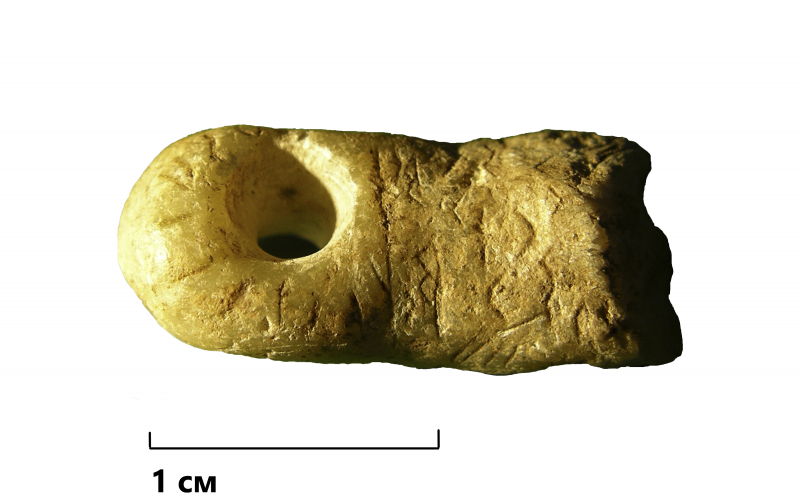Ornamented pendant
The item has an elongated shape and made of monomineral greenish-milk talc. The upper part of the item is round and has a small thickening (roller). On the roller, there are some notches with the length of 1.5 - 1.9 mm. We can clearly see 11 notches. In total (based on the assumed symmetry of the ornament) 12 or 13 notches were supposedly made. The upper part of the item is divided by an indentation and a contoured belt. Its width is 2.16 mm. Lower, in the body zone, there are some single deep traces, scratches, intentional notches located quite chaotically. In the lower part of the item, in the middle, there is a small volumetric symmetrical ledge made with the intentional shaping of a burin.
Manufacturing technique
The artefact has a good quality of preservation of the surface. Clear traces of manufacturing and using the item were found by microscopic analysis. The analysis of the traces gives grounds to assert the use of two types of treating tools - a burin and a reamer.
The hole is made in a good quality. Its cross section is almost symmetric. On the second stage of the working process, the forming of the surfaces was made with a burin. The ornament lines were made with a burin. The forming of the relief and its volumetric elements were made also with a burin.
Use-wear traces
Use-wear traces of the artefact are represented as typical traces of polishing that form of a contact with a relatively soft, probably organic surface. Such traces were found only on one side that can indicate a rather specific pendant fastening system.
Size
Length (along the long axis of the item) - 22,46 mm
Width of the "head" - 9,95 mm
Width of the "body" - 9,90 mm
Thickness (min) - 6,18 mm
Thickness (max) - 7,38 mm
Diameter of the hole - 2,7 mm
Material
talcDating
30 -35 th. years BPCulture
Early Upper PaleolithicThe author of the excavations
Lbova L.V.2005
Publications
Lbova L. Problems of Dating of the Upper Paleolithic in the Transbaikal Region // The Current Issues of Paleolithic studies in Asia / Eds. A. P. Derevianko, M. V. Shunkov. Novosibirsk: IAET SO RAN, 2008. Р. 78–82.
